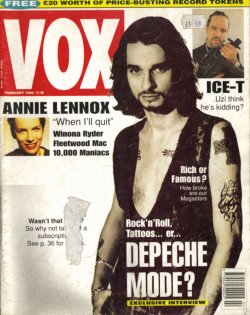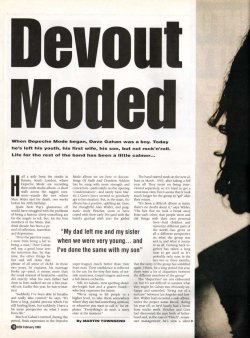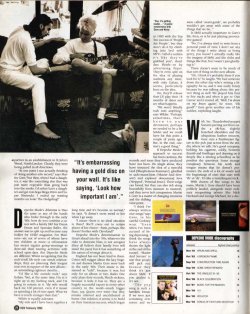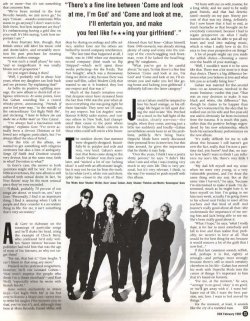You are using an out of date browser. It may not display this or other websites correctly.
You should upgrade or use an alternative browser.
You should upgrade or use an alternative browser.
Depeche Mode Devout Moded (Vox, 1993)
- Thread starter demoderus
- Start date
-
- Tags
- 1993 devout moded vox
Article interviewing Martin, Alan and Dave (separately!) regarding the forthcoming Songs Of Faith And Devotion album and looking back at their career given that the members had just entered their thirties. The band members open up more than previously regarding their personal lives, but the views aren't always balanced and with hindsight you can scrape the irony off of some of Dave's comments with a trowel.
" "I'd like a life outside rock,' says Gahan, "but, at the same time, I'm in it right up to my fucking neck, and I'm going to remain in it. My wife would back me 100 percent, even if it meant us spending a lot of time apart. What we have is much stronger than that." "
Half a mile from the studio in Barnes, South London, where Depeche Mode are recording their tenth studio album - a short walk across the ragged common - stands the tree where Marc Bolan met his death, two weeks before his 30th birthday.
Quite how Pop's glamorous elf would have struggled with the problems of being a famous thirty-something are for the angels to tell, but, for the four members of the Mode, that third decade has been a period of reflection, transition and depression.
"Over the past few years, I went from being a lad to being a man," Dave Gahan will say, a good hour into the interview. But, by that time, the other things he has said will drain that phrase of all sense of cliche. In those two years, he explains, his marriage broke up - amid, it seems, more than the usual amount of heartache - and he did exactly what his own father had done to him: walked out on a five-year-old son. Earlier this year, he was re-married.
"Suddenly I've been able to breathe and really take control," he says. "It's been a long, painful process which I'm still healing from, but suddenly I have a lot more perspective on what I want from life."
Much of Gahan's turmoil, during this period, finds expression in the Depeche Mode album we are here to discuss: Songs Of Faith And Devotion. Seldom has he sung with more strength and conviction - particularly on the opening 'Condemnation' - and rarely have Martin L Gore's lyrics seemed so peculiarly apt to his situation. But in the main, the album has a positive, uplifting air. Gore, the thoughtful Alan Wilder, and pragmatic Andy Fletcher, seem to have coped with their early 30s (and with the band's gradual shift into the global super-league) much better than their front-man. Their confidence is reflected in the use, for the very first time, of outside musicians, Gospel singers and even a full-blown orchestra.
Still, it's Gahan - now sporting shoulder-length hair and a goatee beard - who best expresses the intent.
"We're trying to lift people to a higher level, to take them somewhere where they can find something spiritual, or whatever you want to call it," he explains. "Everything's in such a sorry state at the moment."
The band started work on the new album in March, 1992, after taking a full year off. They insist in being interviewed separately, so it's hard to get a consensus view, but it seems that it took much longer for the group to 'gel' after their return.
"It's been a difficult album at times, there's no doubt about it," says Wilder. "The fact that we took a break away from each other, that people went and did things with their own personal lives - had children and moved to different parts of the world - has given us all a different perspective on what the group was and is, and what it means to us all. Coming back together has taken a long time to get used to. It's probably only now, in the last two or three months, that the unity of the group has solidified again. I think, for a long period this year, there were a lot of disparities between the different members of the group."
The "disparities" are not elaborated on, but it's not difficult to surmise what they might be. Gahan was obviously unhappy and unsettled, "living out of a suitcase" between Los Angeles and London. Wilder had recorded a solo album, under the project name Recoil, during his year off, so he'd barely had a break from studio work. Fletcher and Gore had discovered the joys both of fatherhood and, in the case of 'Fletch', restaurant management: he's now a silent partner in an establishment in St John's Wood, North London. Clearly, they were being pulled in all directions.
"At one point I was actually thinking of doing another solo record," says Martin Gore, "but then, when I had a daughter, it was like something else that was just more enjoyable than going back into the studio. [1] I'd rather have a daughter and get into Sega Mega-Drive and Super Nintendo. I ended up wasting months on Sonic The Hedgehog!"
Depeche Mode's dilemma is thus the same as any of the bands who broke through in the early '80s: how do you combine a career with family life? For Duran Duran and Spandau Ballet, the answer was to split up and become easy fodder for Hello! magazine. For Madness - six out of seven of whom have two children or more - a reformation has meant regular group meetings to dove-tail their touring activities with school open-days. But Depeche Mode are different. Whilst recognising that the rock'n'roll lifestyle can wreck relationships, they are planning their longest tour ever in support of the new album - an astonishing eighteen months.
"I'd like a life outside rock,' says Gahan, "but, at the same time, I'm in it right up to my fucking neck, and I'm going to remain in it. My wife would back me 100 percent, even if it meant us spending a lot of time apart. What we have is much stronger than that."
Wilder is equally adamant.
"My wife and I have been together a long time and it's become so normal," he says. "It doesn't seem weird to her when I go away.
"I mean - there is no ideal situation is there? She'll come out to certain places of her choice - Paris, perhaps. She doesn't bother with Cleveland!"
Depeche Mode's determination to thrust ahead into the '90s, whatever the risk to domestic bliss, is not arrogant (they all believe their family lives will stand the pace) but it has something of the nature of revenge about it.
England has not been kind to them. Critics still snigger about the lacy lingerie and dresses Martin Gore wore back in the early '80s. Their music is dismissed as 'cold', because it was, but only for an album or two. Radio One only plays their records, Fletch reckons, because it feels it has to. They are a hugely successful export to every other country in the world - much bigger than, say, Queen ever were - but they remain unloved and uncelebrated at home. One solution, it seems, is to build on their American success, which began in 1985 with the Top Ten success of 'People Are People', but they won't do it by climbing into bed with MTV - "all of a sudden it's like they've grabbed you", shudders Fletch - or by advertising Pepsi. They're even split on the idea of playing stadiums any more, with only Gahan, it seems, particularly keen on the idea.
No, they'll release their LP, play their 18 months of dates and see what happens.
"We won't blindly rush into anything," says Wilder. "Perhaps, sometimes, that's been to our detriment, perhaps we needed to be a bit bolder and we could have hit this point a couple of years ago. But in the end, caution's a good thing."
If Depeche Mode's approach to success has been cautious, the records and tours they have produced have not been. On single alone, they have trounced the idea of a merciful God ('Blasphemous Rumours'), glorified in sado-masochism ('Master And Servant') and explored obsessional love ('Stripped', 'Personal Jesus'). Their songs can brood, but they can also tick along beautifully from moment to moment, and they never lack compassion. Martin L Gore is a master of changing emotions and the shifting view-point.
"I think I've always written nice songs," says Gore in his careful Cockney way. "Even when I've been accused of being depressing, I think the songs have always shown the light at the end of the tunnel.. 'Master And Servant' is the one that people will pick out, because they think it's just about S&M. If you analyse it, it's not.
"The pop song is such a harmless format. If we were just screaming over noises and we were called 'avant-garde', we probably wouldn't get away with some of the things that we do..."
Is S&M actually important in Gore's life, then, or is he just playing provocative games?
"No, I've always tried to write from a personal point of view. I don't see any of the things I write about as being pervy, you know? I actually really like the imagery of S&M, and the clubs and things like that, but I wasn't just glorifying it."
There doesn't seem to be much of that sort of thing on the new album.
"Oh, I think it's probably there if you look for it," he laughs. "We had someone down the other day who's writing a biography for us, and it was really funny because he was talking about this pervert thing as well. We played him four or five tracks and when it got to 'One Caress' and it started off, 'Well I'm down on my knees again', he went, 'Oh good!'." Gore gives another one of his sudden, exploding laughs.
[1] - Martin's first solo album was the six-track 'Counterfeit' EP of covers, released in 1989.










